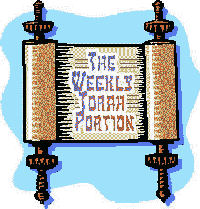Search our Archives:
» Home
» History
» Holidays
» Humor
» Places
» Thought
» Opinion & Society
» Writings
» Customs
» Misc.
|
Spiritual Nourishment
By Michael Chessen
The Torah reading of Ekev continues a theme now familiar from previous
readings that stipulates positive rewards for learning and keeping the laws
of the Torah and warns of negative results for failing to do so. The
opening verse of Ekev suggests that whereas the "merit of the patriarchs
and matriarchs" in any event obliges God to deal with Israel mercifully,
the extent that we will be genuinely blessed with well being and material
sustenance is dependent upon our rigorous and loving adherence to the
covenant which God made with our forefathers.
The term "ekev" literally means "because" but alludes to an act of
"following". At this advanced point in the Five Books of Moses, after
having established us as a holy nation, inspired us with God's awesome
power and instructed us to keep the Torah, God seems to now express primary
concern for our sense of awareness and perspective. Accordingly Ekev opens
by first exhorting us to "listen" to the laws, i.e. learn the Torah, and
later makes certain statements such as the famous "Man does not live by
bread alone"(Deut. 8:3).
Although the Torah later instructs us that we are to bless God after
having eaten and been satisfied, it goes on to warn us against a full
stomach as potentially constituting the first step leading to our becoming
"haughty" and forgetting God. In light of this, the rabbinical or halachic
interpretation of "satiation" is here most instructive. Although
maintaining a healthy balanced diet would certainly fall under the Torah's
exhortation to "guard our souls", a person is required to recite the
blessing after meals after having minimally consumed two slices of bread,
regardless of whether one was able to completely "fill" one's self at a
given sitting. For the verse stating that we do not live by bread alone
concludes that we also live by "all that comes out of God's mouth", namely,
the Torah. Therefore, our study of the Torah which accompanies our daily
bread will spiritually complete our sense of "satiation". However, if one
seeks to emulate the hospitality of Abraham, and especially if one is
seeking to fulfill the commandment of tzedaka, literally "making justice",
by providing a needy person with a meal, then one is obliged to provide for
the other's physical satiation.
If Torah study doesn't ensure our awareness of our dependence on God
then the nature of the Land will. As compared to Egypt, continuously
irrigated by the Nile, the Land of Israel depends on rain and is,
therefore, "constantly under God's scrutiny" (Deut. 10:12). Rabbi David
Samson points out that the city of Jericho, irrigated by the Jordan and
receiving little yearly rainfall, constitutes a "sampling" of the Egyptian
condition within the boundaries of the Holy Land. Perhaps to compensate for
the appearance of God's concealment in Jericho, i.e., because of the area's
"natural" irrigation, Jericho may have been singled out for certain
"miraculous" revelations of God's powers.
In his great love and benevolence, God sees to it that we maintain
awareness of all that He does for us, in order that we may benefit
ourselves.
Wishing you all a Shabbat Shalom !

|
|
Please let us know if you see something unsavory on the Google Ads and we will have them removed. Email us with the offensive URL (www.something.com)
|





|
